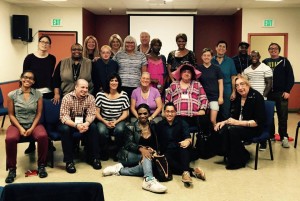A few weeks ago, as I led my congregation and members of the community in a vigil for the annual Transgender Day of Remembrance, I caught myself thinking about what elements of the service I will keep or change when this event rolls around next year. As a pastor, of course, it is easy to slip into worship planning. But there, in the candle-lit sanctuary, an unpleasant reality hit me like a ton of bricks: there is no doubt that there will be Transgender Day of Remembrance services next year. Without question, we know that in a year’s time we will once again be honoring those who are murdered because of transphobia—people who today are still alive and will be killed in the year to come.
 At CLGS we recognize our opportunity and responsibility to be a prophetic witness for justice in a world that devalues trans people. In October, at our 2015 Multi-Faith Transgender Summit, we experienced some renewed hope for social justice. On the campus of Pacific School of Religion in Berkeley and at City of Refuge UCC in Oakland, this year’s Summit had a specific focus on violence against trans people, particularly the increase of attacks against trans women of color. The Summit concluded with a community action forum: Confronting Violence Against Transgender Communities. This was an opportunity for trans people and allies to come together and discuss the intersections of identities and start brainstorming about how best to respond to the crisis we face as a community.
At CLGS we recognize our opportunity and responsibility to be a prophetic witness for justice in a world that devalues trans people. In October, at our 2015 Multi-Faith Transgender Summit, we experienced some renewed hope for social justice. On the campus of Pacific School of Religion in Berkeley and at City of Refuge UCC in Oakland, this year’s Summit had a specific focus on violence against trans people, particularly the increase of attacks against trans women of color. The Summit concluded with a community action forum: Confronting Violence Against Transgender Communities. This was an opportunity for trans people and allies to come together and discuss the intersections of identities and start brainstorming about how best to respond to the crisis we face as a community.
The current cultural landscape in this country has put the bodies and lives of trans people up for discussion and on display in ways we have never before seen. Potential victories for human rights ordinances have been derailed by a strategic scare tactics and propaganda about the supposed dangers associated with trans people. Much of the discriminatory policies and hateful propaganda comes from religious leaders. Trans people in many places are now being denied the basic rights in frightening ways, for instance the right to use a public restroom. Through our work we can show that these misguided voices do not speak for all religious leaders. They may have loud voices, but they do not get to appoint themselves as the spiritual guides for the moral fabric of this country.

From Left: 2015 Trans* Seminarians Cohort: Barbara Satin (cohort leadership), Greyson Vega, Jakob Hero (cohort faculty), Jamie Lee Sprague-Ballou, Nicole Garcia, Kelsey Pacha, and Angel Collie (cohort faculty)
As a religious leader and as a trans person I know the impact that these voices of hate have on our community. I know the weight of the reality that we are already planning for next year’s Trans Day of Remembrance services. However, I also know that we have the power to radically shift the public understanding of trans people. In doing so, we not only help the trans community but we strengthen faith communities as well. This is our calling, as people who engage deeply with religion in this country, as a center the helps train religious leaders and those at the forefront of social justice, we have an amazing opportunity to speak the truth of gender diversity and to radically transform the conversation.


